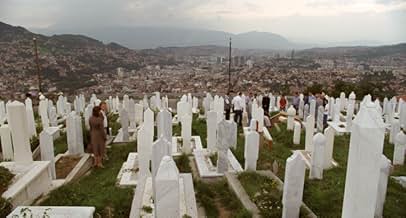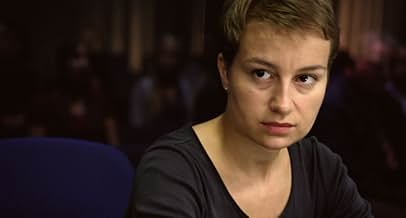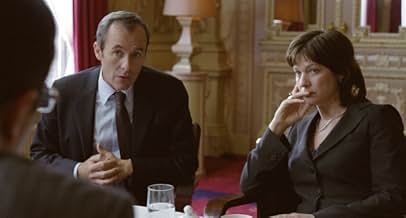IMDb-BEWERTUNG
6,9/10
1401
IHRE BEWERTUNG
Füge eine Handlung in deiner Sprache hinzuHannah Maynard, a prosecutor of Hague's Tribunal for war crimes in former Yugoslavia, charges a Serbian commander for killing Bosnians. However, her main witness might be lying, so the court... Alles lesenHannah Maynard, a prosecutor of Hague's Tribunal for war crimes in former Yugoslavia, charges a Serbian commander for killing Bosnians. However, her main witness might be lying, so the court sends a team to Bosnia to investigate.Hannah Maynard, a prosecutor of Hague's Tribunal for war crimes in former Yugoslavia, charges a Serbian commander for killing Bosnians. However, her main witness might be lying, so the court sends a team to Bosnia to investigate.
- Regie
- Drehbuch
- Hauptbesetzung
- Auszeichnungen
- 8 Gewinne & 8 Nominierungen insgesamt
Drazen Kuhn
- Goran Duric
- (as Drazen Kühn)
Nadezda Perisic Radovic
- Biljana Duric
- (as Nadezda Perisic-Nola)
Empfohlene Bewertungen
The first thing we have the right to expect from actors is that they can speak loudly and clearly enough to be understood by everybody in the audience. I am sorry but mumbling is not good enough for a professional who makes his/her living by speaking. The subject of the movie seemed attractive enough but after half an hour of straining our ears to understand what was going on, my wife and I decided that no matter how bad we'd love to see the bad guy brought down, enough bad acting was enough. It was made worse because the movie was supposed to be subtitled and it was not. Please, miss Fox and company, call me back when you have passed your exam in elocution.
STORM works best as a legal thriller (I'm a criminal lawyer). Its depictions of witnesses, evidentiary rules, discussions with opposing counsel, etc., are done very well. STORM's acting, dialog, shooting and direction are done professionally and convincingly; e.g., the film never drags and, until the end, there's nothing that drags or takes one "out of the film". The intertwining of the political influences is also done well. It should be made clear that while the Balkans tragedy serves as the vehicle for STORM, this is not a movie about those horrors in particular; i.e., the same film may have made using a different conflict.
Having said so much, STORM lacks passion. Its as if a talented group of people were tasked with making the movie, put in many hard days, then went back to pursuing what they truly loved. The lack of passion may result from STORM's lack of evil clearly depicted villains; i.e., stuff which arouses viewers. Indeed, hardly any background or time is given the Defendant in the docket for the entire film. The horrific scenes of the crimes involved are not seen but provided via the courtroom testimony. I understand that such may be precisely what the makers of STORM wanted to do; i.e., not be explicit to highlight the routine and tedium of legal work. If so, they succeeded. Maybe too well.
Having said so much, STORM lacks passion. Its as if a talented group of people were tasked with making the movie, put in many hard days, then went back to pursuing what they truly loved. The lack of passion may result from STORM's lack of evil clearly depicted villains; i.e., stuff which arouses viewers. Indeed, hardly any background or time is given the Defendant in the docket for the entire film. The horrific scenes of the crimes involved are not seen but provided via the courtroom testimony. I understand that such may be precisely what the makers of STORM wanted to do; i.e., not be explicit to highlight the routine and tedium of legal work. If so, they succeeded. Maybe too well.
Storm (2009)
It is hard for people outside of the United Nations crimes courts to know quite how that world feels from the inside. I think it's too foreign, in every way, to know. And Hollywood tends to approach this kind of situation with heightened drama, exaggerated flair, darker darks and more romantic romances. I'm not a U.N. insider, but this isn't Hollywood and "Storm" feels as close to getting to the reality of that world as you can get in a fictional milieu. That's the brilliance of the filmmakers, withholding and avoiding undue drama but also making the characters complex and interesting.
Of course, restraint isn't always the way to engross your audience, and "Storm" tends to be interesting all along. It feels important and principled, a lot like its characters. This might help it last as a classic of some sort, gaining over time some of the shine it doesn't quite have now. But there is also the issue of why, exactly, the victims of war atrocities in the Bosnian conflict were forgotten by most of the world in the years after the war ended. From an American point of view, Yugoslavia had always seemed far away, not quite Europe, not quite Asia, becoming a mix of newly minted countries from the dissolution of a big one that had always remained isolated internationally. But the Europeans understand one of their own, and if this movie is right, it seems that Bosnia (and Serbia et al) were largely forgotten once the actual war was over. "Storm" is a particularly European approach to the issue, a Danish film overall, but a multi-culti multi-country production that fits its subject perfectly.
This movie is about a kind of dogged heroism that is part of the glory, really (no joke) of the United Nations. You come to appreciate the struggling, idealist foreign service and civil rights work that goes on at the lower levels of the U.N. completely out of sight, but critically important. Here the fight is led by a discouraged mid-career lawyer played by Kerry Fox with something approaching perfection. Her character is so everyday (for a high powered lawyer), you sometimes forget that the actress is pulling it off so well. The second lead comes in only halfway through, the equally brilliant Romanian actress Anamaria Marinca, who is a victim being coaxed into testifying, even though it is putting her life and her family in mortal danger.
Not many movies get made about this world in part because it's a little dry. There are no shootouts or bombs, just suspicious glares, sudden backroom decisions. But it's an important movie, at least it was for me, giving me just a small insight into that world, and into the social wreckage of the Bosnian war. If it had been given more drama, it would have acquired more hype, and director Hans-Christian Schmid deserves a bow for his steadfastness.
In researching a little, I found this review which I thought was really well written, you might also enjoy: http://www.filmcritic.com/reviews/2009/storm/
Or just see the darned movie.
It is hard for people outside of the United Nations crimes courts to know quite how that world feels from the inside. I think it's too foreign, in every way, to know. And Hollywood tends to approach this kind of situation with heightened drama, exaggerated flair, darker darks and more romantic romances. I'm not a U.N. insider, but this isn't Hollywood and "Storm" feels as close to getting to the reality of that world as you can get in a fictional milieu. That's the brilliance of the filmmakers, withholding and avoiding undue drama but also making the characters complex and interesting.
Of course, restraint isn't always the way to engross your audience, and "Storm" tends to be interesting all along. It feels important and principled, a lot like its characters. This might help it last as a classic of some sort, gaining over time some of the shine it doesn't quite have now. But there is also the issue of why, exactly, the victims of war atrocities in the Bosnian conflict were forgotten by most of the world in the years after the war ended. From an American point of view, Yugoslavia had always seemed far away, not quite Europe, not quite Asia, becoming a mix of newly minted countries from the dissolution of a big one that had always remained isolated internationally. But the Europeans understand one of their own, and if this movie is right, it seems that Bosnia (and Serbia et al) were largely forgotten once the actual war was over. "Storm" is a particularly European approach to the issue, a Danish film overall, but a multi-culti multi-country production that fits its subject perfectly.
This movie is about a kind of dogged heroism that is part of the glory, really (no joke) of the United Nations. You come to appreciate the struggling, idealist foreign service and civil rights work that goes on at the lower levels of the U.N. completely out of sight, but critically important. Here the fight is led by a discouraged mid-career lawyer played by Kerry Fox with something approaching perfection. Her character is so everyday (for a high powered lawyer), you sometimes forget that the actress is pulling it off so well. The second lead comes in only halfway through, the equally brilliant Romanian actress Anamaria Marinca, who is a victim being coaxed into testifying, even though it is putting her life and her family in mortal danger.
Not many movies get made about this world in part because it's a little dry. There are no shootouts or bombs, just suspicious glares, sudden backroom decisions. But it's an important movie, at least it was for me, giving me just a small insight into that world, and into the social wreckage of the Bosnian war. If it had been given more drama, it would have acquired more hype, and director Hans-Christian Schmid deserves a bow for his steadfastness.
In researching a little, I found this review which I thought was really well written, you might also enjoy: http://www.filmcritic.com/reviews/2009/storm/
Or just see the darned movie.
The inner workings of the European Union appear centre stage as Hans- Christian Schmid (director and co-writer) shines his critical spotlight upon an ostensibly expanding crevice of stark reality wedged between true justice and political expediency.
The dialogue is well structured, while the script, which is occasionally laboured, gains credence by dealing with topical issues with an obvious knowledgeable insight. Yet, ironically, this is also the movies Achilles heel. Events and procedures are so close to the inner workings of a legal system governed by technicalities that Schmid occasionally abandons entertainment for frustrating boring reality. Points against the European Union are often well made, but, at times, lack balance, and his criticism is unconstructive in nature, yet he does soften slightly as the film approaches the credits, and so, in so doing, leaves his audience with the slimmest slither of hope.
Storm is a dark, thought provoking drama that, having the courage of its convictions, aims high only to fall short at the final hurdle. MG
The dialogue is well structured, while the script, which is occasionally laboured, gains credence by dealing with topical issues with an obvious knowledgeable insight. Yet, ironically, this is also the movies Achilles heel. Events and procedures are so close to the inner workings of a legal system governed by technicalities that Schmid occasionally abandons entertainment for frustrating boring reality. Points against the European Union are often well made, but, at times, lack balance, and his criticism is unconstructive in nature, yet he does soften slightly as the film approaches the credits, and so, in so doing, leaves his audience with the slimmest slither of hope.
Storm is a dark, thought provoking drama that, having the courage of its convictions, aims high only to fall short at the final hurdle. MG
Hannah Maynard (Kerry Fox) is a prosecutor at Hague's Tribunal for war crimes. She's given the trial against a Serbian commander 3 years after his arrest. The prosecution goes into a tail spin when the main witness's testimony is found to be factually wrong. She's under pressure and has to restart the investigation. She finds the witness's sister Mira Arendt (Anamaria Marinca) to be the real witness. Everybody is under threat. Mira had tried to start a new life in Germany. Entrenched powers, political expediency and brutal thuggery threatens to derail the truth.
Parts of this movie have great intensity but other parts get dragged down by the mechanics of the investigation and minutia of the trial. Kerry Fox is solidly in the lead while Anamaria Marinca provides the power. Other movies of its kind would provide constant flashbacks to inject the horror of war. This is a smaller undertaking but I think that the climax would be better served with a more powerful flashback reveal.
Parts of this movie have great intensity but other parts get dragged down by the mechanics of the investigation and minutia of the trial. Kerry Fox is solidly in the lead while Anamaria Marinca provides the power. Other movies of its kind would provide constant flashbacks to inject the horror of war. This is a smaller undertaking but I think that the climax would be better served with a more powerful flashback reveal.
Wusstest du schon
- WissenswertesBoth Kerry Fox and Stephen Dillane starred in 'Welcome To Sarajevo'. Both movies had scenes filmed in the Holliday Inn, Sarajevo.
- Zitate
[last lines]
Mira Arendt: Thank you.
- VerbindungenReferences Rocky (1976)
Top-Auswahl
Melde dich zum Bewerten an und greife auf die Watchlist für personalisierte Empfehlungen zu.
- How long is Storm?Powered by Alexa
Details
- Erscheinungsdatum
- Herkunftsländer
- Offizielle Standorte
- Sprachen
- Auch bekannt als
- Storm
- Drehorte
- Produktionsfirmen
- Weitere beteiligte Unternehmen bei IMDbPro anzeigen
Box Office
- Bruttoertrag in den USA und Kanada
- 16.013 $
- Eröffnungswochenende in den USA und in Kanada
- 8.307 $
- 1. Nov. 2009
- Weltweiter Bruttoertrag
- 1.661.518 $
- Laufzeit1 Stunde 43 Minuten
- Farbe
- Seitenverhältnis
- 2.35 : 1
Zu dieser Seite beitragen
Bearbeitung vorschlagen oder fehlenden Inhalt hinzufügen





























